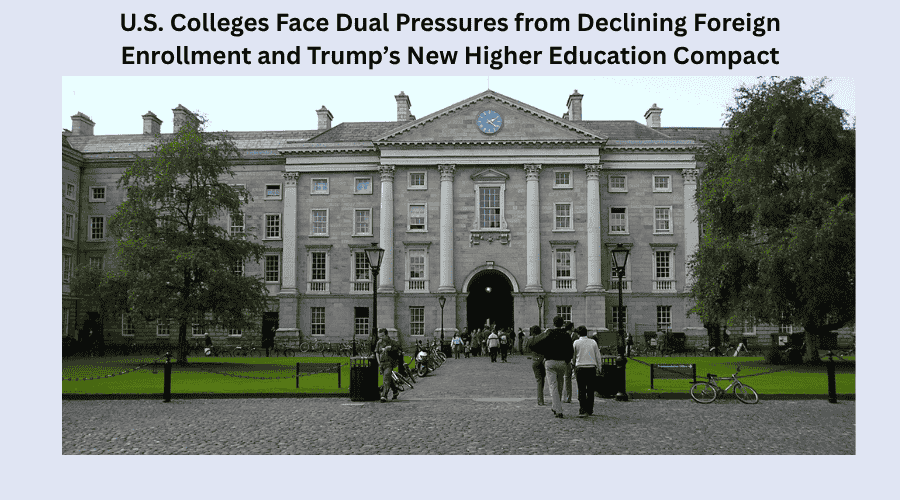Key Points:
- DePaul University announces sharp budget cuts after a 30% drop in international enrollment, reflecting nationwide declines tied to visa hurdles and federal policy shifts.
- The Trump administration unveils a “Compact for Academic Excellence,” offering preferential funding to universities that adopt its ideological priorities.
- Critics warn of mounting threats to academic freedom, financial stability, and global competitiveness of U.S. higher education.
Shrinking International Enrollment Strains U.S. Universities
DePaul University in Chicago has become the latest institution to announce budget reductions following steep declines in international student enrollment. President Robert Manuel told faculty this week that enrollment of foreign students dropped by 755 compared to last year, including a 62% fall in first-year graduate students.
International students historically bring significant tuition revenue, but tighter visa policies and political headwinds are reshaping the landscape.
Manuel cited student visa delays, revocations, and the broader perception that U.S. campuses are less welcoming under current immigration rules. He also warned that reduced federal research funding—a long-standing draw for overseas scholars—has further dampened interest in studying in America.
DePaul is not alone. Dozens of colleges nationwide have reported similar declines, prompting budget cuts such as hiring freezes and executive pay reductions. While complete enrollment data for this academic year is still pending, early figures suggest a notable shift of international graduate students toward institutions outside the U.S.
This shift has sparked concerns over the financial sustainability of American higher education and its reputation as a global leader.
White House Seeks Ideological Compact With Universities
At the same time, the Trump administration is pushing a sweeping new initiative designed to reshape higher education policy. This week, the White House sent a 10-page “Compact for Academic Excellence in Higher Education” to nine major universities, including MIT, Brown, and the University of Virginia. Schools that agree to the compact could receive “substantial and meaningful” increases in federal funding and grants.
The compact outlines controversial requirements: capping international undergraduate enrollment at 15%, abolishing race and gender considerations in admissions and hiring, enforcing strict biological definitions of gender for athletics and facilities, and mandating the use of standardized tests such as the GED or SAT. It also calls for dismantling campus programs accused of silencing conservative ideas and imposing tuition freezes.
Critics, including higher education advocacy groups, argue that the plan amounts to government overreach and threatens academic freedom. They warn it could further politicize universities while discouraging global engagement, especially at a time when international enrollment is already plummeting.
The nine targeted institutions have been invited to provide feedback before the compact is finalized in November. Whether universities accept these terms may shape not only their access to federal funding but also the future direction of U.S. higher education amid growing political polarization.

